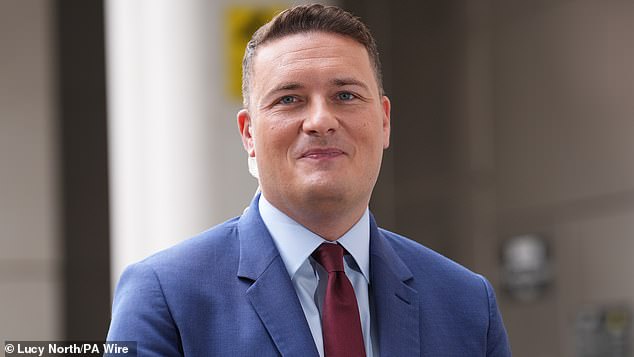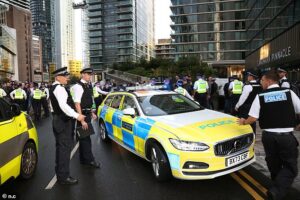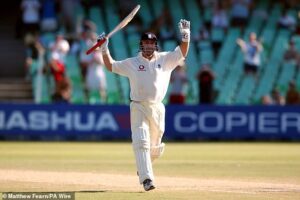
Resident doctors have vowed to plough on with their five-day strike after abandoning peace talks with Wes Streeting.
The health secretary last night accused the British Medical Association of showing ‘complete disdain for patients’ and described their walkout as ‘unjustified’.
Health leaders were also quick to round on the union, warning their ‘crushing’ and ‘misjudged’ action would cause widespread disruption and harm.
Rory Deighton, acute director at the NHS Confederation, which represents health organisations, said: ‘The BMA will clearly bear the responsibility for the distress being caused to patients.
‘While we recognise the concerns that resident doctors have, we believe the strikes are a misjudged course of action given the large pay rise that resident doctors have already received.’
Up to 50,000 resident doctors – formerly known as junior doctors – are set to strike from 7am on Friday in pursuit of a 29 per cent pay rise.
They have already received above inflation pay rises for the past three years, worth an extra 28.9 per cent in total, following previous strikes.
This includes an inflation-busting rise this year of 5.4 per cent, which is the most generous in the public sector.

Health secretary Wes Streeting
The BMA and Department of Health and Social Care held talks over the weekend with the aim of negotiating a settlement and averting industrial action.
Mr Streeting had refused to budge on pay but offered a number of other financial concessions relating to the cost of exams, equipment and training.
The BMA’s delegates took the offer to the union’s resident doctors committee but members voted to reject it this afternoon and immediately announced they would proceed with the walkout.
It said Mr Streeting’s offer ‘did not go far enough to warrant calling off strikes’ and lacked any ‘substantive proposal on both pay and non-pay elements’.
Dr Melissa Ryan and Dr Ross Nieuwoudt, co-chairs of the BMA’s RDC, said: ‘Disappointingly, what we saw would not have been significant enough to change the day-to-day financial situation for our members.
‘The non-pay aspects of last year’s pay deal have still not been delivered, which has shaken the confidence of our members that any further non-pay elements would be honoured.’
Mr Streeting said: ‘After a 28.9 per cent pay hike in the last three years and the highest pay rise in the public sector two years in a row, strike action is completely unjustified, completely unprecedented in the history of British trade unionism and shows a complete disdain for patients and the wider recovery of the NHS.’
Rachel Power, chief executive of the Patients Association, said: ‘This latest strike adds even more uncertainty for people who are waiting in pain, with anxiety, and without answers, and will leave more patients vulnerable and unsupported as their health and wellbeing deteriorates.

A British Medical Association protest over doctors pay
‘It demonstrates a worrying disregard for the very real toll this further disruption will have on people’s health and their confidence in the healthcare system.’
The announcement came after health bosses warned striking doctors will cause patients ‘undoubted harm’ and a new poll revealed the majority of the public now oppose walkouts.
The latest YouGov poll reveals more than half (52 per cent) of people in the UK either ‘somewhat oppose’ (20 per cent) or ‘strongly oppose’ (32 per cent) the idea of resident doctors going on strike over pay.
Meanwhile, only a third (34 per cent) of the 4,954 adults surveyed either ‘somewhat support’ (23 per cent) or ‘strongly support’ (11 per cent) doctor strikes.
YouGov said the proportion supporting the strike over pay has dropped five points since it last asked the question in May.
Then, 48 per cent opposed resident doctors striking, while 39 per cent supported them taking action.
Daniel Elkeles, chief executive of NHS Providers, said of the BMA’s announcement: ‘This decision is a crushing blow for patients and for the NHS.
‘We urge resident doctors to help trusts minimise the harm by notifying them of their plans for strike days.

Daniel Elkeles, chief executive of NHS Providers (right), shakes hands with prime minister Sir Keir Starmer (centre)
‘For example we must ensure that there are enough staff for all the cancer, transplant and maternity care that cannot and must not be delayed.
‘Another huge worry is the cost.
‘It is vital that consultants providing cover take NHS rates of pay rather than insisting on inflated BMA rates that are simply unaffordable.
‘We say to the BMA “think again” and pull back from this hugely damaging decision.’
The BMA is demanding NHS hospitals pay consultants £6,000 to provide on-call cover for striking junior colleagues this weekend.
This would be even higher if they have to given advice over the phone or attend hospital in person.
NHS England said it is ‘vital’ people do not put off seeking care during the strikes and managers are working hard to maintain ‘as much routine care as possible’.
Patients should continue to attend appointments as planned unless they are told otherwise by their local trust, it added.
The BMA says the pay of resident doctors has been cut in real terms since 2008 and it wants to achieve full pay restoration.






